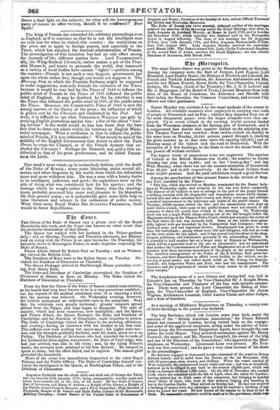Zbe elourt.
THE illness of the Duke of Sussex cast a gloom over all the Royal Households this week, and the Court has known no other event than the mournful termination of that illness.
The Queen has walked with her husband in the Palace-gardens daily ; and on Monday, Tuesday, and Thursday afternoon, her Majesty took an airing with the Prince in an open barouche. On Thursday, the barouche drove to Kensington Palace, to make inquiries respecting the Duke of Sussex.
Prince Albert visited Sir Robert Peel on Tuesday ; and on Wednes- day viewed the Reform Club.
The Dutchess of Kent went to the Italian Opera on Tuesday. She visited the Dutchess of Gloucester on Thursday.
The Queen Dowager arrived at Marlborough House yesterday even- ing, from Bushy Park. The Duke and Dutchess of Cambridge entertained the Dutchess of Gloucester at dinner, at Kew, on Monday. The Duke visited the Dutchess of Gloucester on Thursday.
From the first the illness of the Duke of Sussex created some anxiety, as his health had long been known to be in a very precarious condition ; but the reports of the medical attendants were of so cheering a kind, that the anxiety was relieved On Wednesday evening, however, the bulletin announced an unfavourable turn in the symptoms. Next day, the solicitude very greatly increased : gloomy rumours spread abroad from the Palace, and hope began to disappear. The calls of inquiry, which had been numerous, now multiplied ; and the Queen and Prince Albert, the Queen Dowager, the Duke and Dutchess of Cambridge, and the Dutchess of Gloucester, made inquiries in person. The Duke of Cambridge visited the Palace in the morning, afternoon, and evening ; having an interview with his brother at his first visit. The sufferer now took nothing but spoon-meat ; his nights were rest- less, and his strength gradually declined, until his death, about 110r.11 on Friday. The Dutchess of Inverness, who had attended the beaside of her husband for three nights, was present ; the Duke of Cambridge, who had just arrived, was also in the room ; and, by the dying Prince's desire, the servants were admitted to bid him fareweL. He essayed to speak to them ; but the effort failed, and he expired. The utmost grief pervaded the household.
News of the event was immediately despatched to the other Royal Palaces, and the Public Offices. The Duke of Cambridge himself con- veyed the intelligence to the Queen, at Buckingham Palace, and to the Dutchess of Gloucester.
Augustus Frederick was the ninth child and sixth son of George the Third, and was born the 27th January 1773; being, consequently, seventy years and nearly three months old at the time of his death. He was Duke of Sussex, Earl of Inverness, and Baron of' Arklow; a Knight of the Garter, a Knight of the Thistle, Grand Cross of Hanover, and a Privy Councillor; High Steward of Plymouth, Ranger of St. James's and Hyde Parks, Colonel of the Honourable Artillery Company ; Grand Master of the United Order of Freemasons of England and Wales; President of the Society of Arts, and an Official Trnsteeof the British and Hunterian Museums.
The Duke of Sussex was twice married, although neither of the marriages received the sanction of the Sovereign under the Royal Marriage Act—first, to Lady Augusta de Ameland Murray, at Rome in April 1793, and in London 5th December 1793; which marriage was declared null by the Prerogative Court in August following. The issue of this marriage are Sir Augustus D'Este, born 13th January 1794, and Ellen Augusta, Mademoiselle D'Este, born 11th August 1801. Lady Augusta Murray survived the separation until March 1830. The Duke's second wife, Lady Cecilia Underwood, daughter of the second Earl of Arran, survives his Royal Highness : she was created Dutchess of Inverness, 30th March 1840.


























 Previous page
Previous page